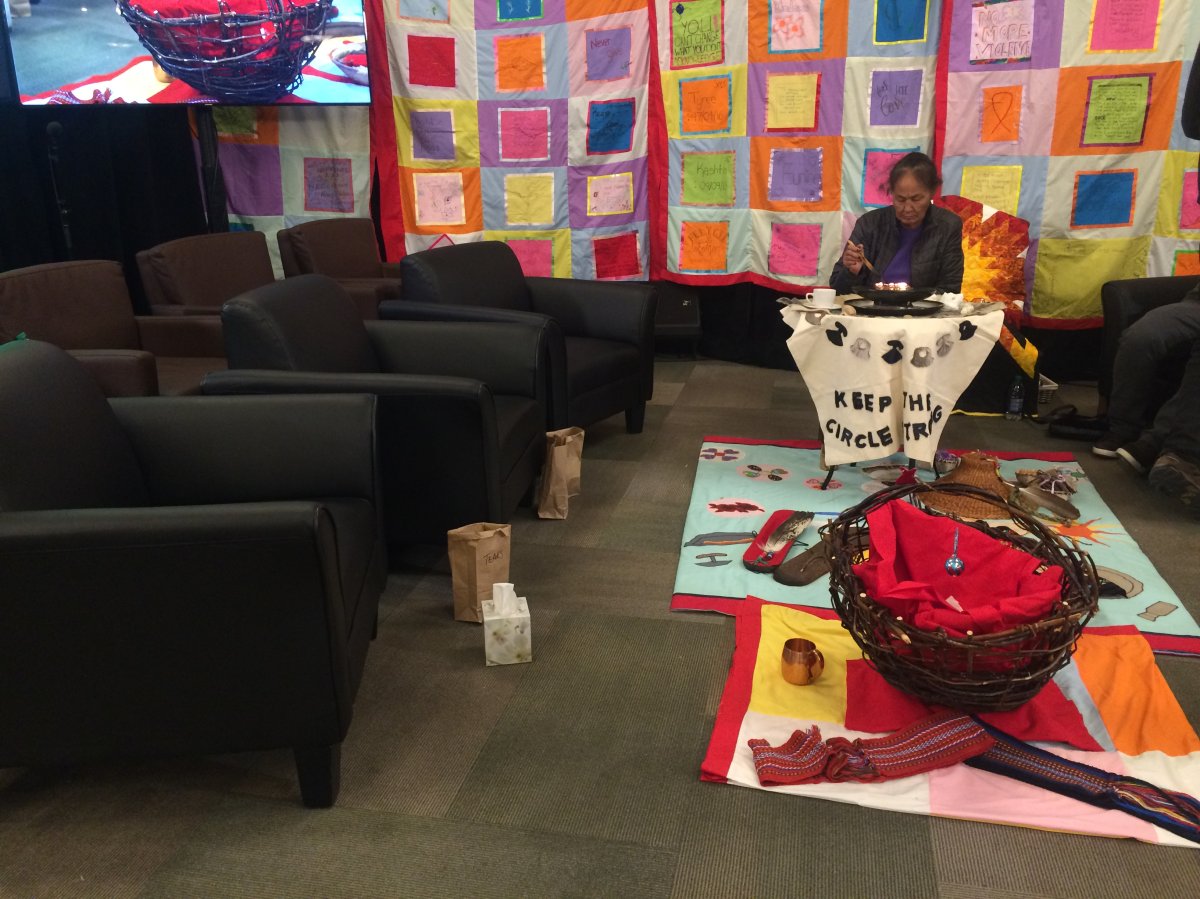The second day of hearings in Winnipeg for the national inquiry for Missing and Murdered Indigenous Women and Girls (MMIWG) began with testimony from the family of Roberta Dawn McIvor.

McIvor was killed in 2011 after attending a party in Sandy Bay First Nation.
RELATED: Families share stories of loss and recovery on first day of MMIWG inquiry in Winnipeg
She went out the night of July 29, and her body was found on a road in the community the next morning.
Her cousin, Alaya McIvor, said Roberta was organized and had planned for a designated driver to take care of her, as she knew she would be drinking that evening.
Roberta fell asleep inside her car after the party, and two teen girls jumped into the vehicle and went on a joyride.
“(The designated driver) said ‘I left the keys in the ashtray’,” Alaya said.
“Why would you leave the keys in the ashtray with my cousin sleeping (inside the car) and the doors unlocked?”
The girls decided at some point to remove Roberta from the vehicle, but didn’t notice she was tangled in her seat belt when they tossed her from the car.
Roberta was dragged behind the car, and eventually decapitated.
Her daughter, Justine Strong, was 14-years-old at the time, and three months pregnant with her own child. The day before Roberta died, Strong said she saw her in a store on the First Nation.
“She was telling me how excited she was to be a grandma, that she was going to be the most fabulous grandma ever,” Strong said.
“It’s really hard on me still. I still sometimes cry myself to sleep at night. It’s hard not having someone to go to, to tell them everything that you’ve accomplished in life, like graduating and being in university. It’s really hard because she’s not there to tell me how proud she is.”
The two girls were charged with manslaughter for their involvement in Roberta’s death, but Alaya says they mocked the McIvor family throughout the court case and following the trials.
“These murderers are free within our communities,” Alaya said, adding she believed initially they would not be let back onto the reserve.
RELATED: Missing, murdered Indigenous women and girls inquiry loses director
Following the family’s testimony, Roberta’s cousin had scathing words for the MMIWG inquiry.
“You guys really failed us. You really failed us drastically,” Alaya said.
In the afternoon, the family of Cherisse Houle shared their stories.
Her mother, Barb, spoke fondly of her daughter, and criticized media for portraying her as a “drug-addicted prostitute” after her death.
Cherisse’s body was found outside Winnipeg in Rosser July 1, 2009. She was 17 years old.
She had been on the street, addicted to drugs before her death, but was trying to change so she could be a better mother to her young son.
“There was one time there, when she said to me ‘Mummy, I need help’,” Barb said.
“This was after she had her son – she was still doing drugs and then she finally realized that she wanted to get the help she needed so she could be a good mum. So she said to me that she needed help, if I could phone her CFS worker so they could place her in a locked facility so she doesn’t have to run to the street to do drugs. I guess she used drugs to cope because they took her son right at birth.”
Barb phoned Cherisse’s worker and was told there were no facilities available for her daughter.
Several weeks later, she was found dead.
“I was at my friend’s house, my best friend, and my sister happened to phone me there and she said ‘I have to talk to you’. I already knew what she was going to tell me, because in the news, they said they found a body, and I haven’t heard from Cherisse in about a week. And I already knew that was my daughter, I felt it,” Barb said.
“I know if she’d got the help she needed, she would’ve been a good mother to her son, because she loved that little boy so much.”
Barb struggled after Cherisse’s death, becoming depressed and thinking of suicide.
Her son, Jordan, talked her out of it, but he was murdered three years after Cherisse, on Maryland Street in Winnipeg.
Cherisse’s cousin, Elexcyus Kramble, was present to give testimony, and spoke to her cousin’s outgoing personality.
Elexcyus had recently become sober the last time she saw Cherisse, and said her cousin wanted to go to the same facility she had attended.
“She was so happy to see me and she gave me a big hug. She goes ‘I heard you stopped drinking and doing drugs’ and I said ‘Yeah I did’ and she’s like ‘Do you think you can take me to where you went?’ and I almost cried,” Elexcyus said. “I was like ‘I can absolutely, totally take you there’ and then I hugged her and I never saw her again. So close she was there to wanting to make a change. Right there. And now she’s gone – and dumped like she was nothing.”
“I know a lot of these girls that died, and they could’ve been amazing. But they’re never going to have that,” Kramble said.




Comments